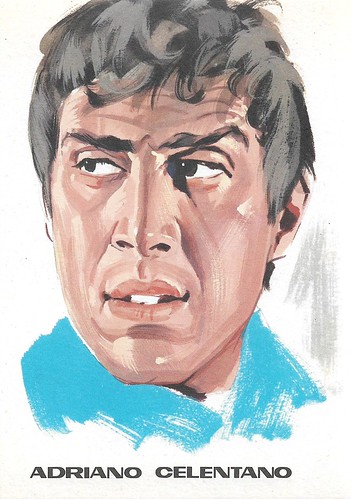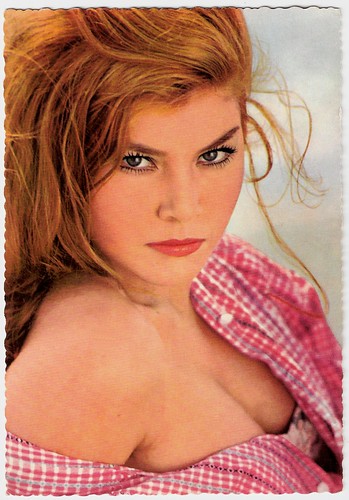French postcard by Publistar/Editions Idoles, no. 763. Photo: Music Records.
French postcard by Editions Starama, no. S 807. Photo: CLAN Celentano Records.
Rock ‘n Roll Revolution
Adriano Celentano was born in 1938 in Milan, Italy. Until his 13th he lived at 14 Via Gluck, about which he later wrote the song 'Il ragazzo della via Gluck' (The Boy of Gluck Road). His parents were from the region of Puglia in Southern Italy and had moved north to work.
Adriano was heavily influenced by his idol Bill Hayley and the 1950s rock ‘n roll revolution. In 1956, he sang Elvis Presley-inspired songs as a member of the Rock Boys.
His first public success was associated with his participation in the first Italian rock 'n' roll festival in his native Milan in 1957. The song 'Ciao Ti Dirò' became an immediate hit. His 1959 song 'Il Tuo Bacio è Come Un Rock' topped the Italian hit-parade.
He also became known as the most famous dancer of the hula hoop fad. In 1961 he participated for the first time in the San Remo festival, the biggest annual showcase for Italian pop music. His song 'Ventiquattromila Baci' (24,000 Kisses) won only a second prize but later sold a million copies and topped the Italian charts. Such a disparity caused controversy, and the San Remo festival even became subject to a Parliamentary hearing.
That same year Celentano founded his own record label, Clan Celentano, in order to have complete artistic control over his music. 'Stai Lontana Da Me', released in 1962, was the first record by the Clan.
Dutch postcard by N.V. Dureco, Amsterdam/Jolly hi-fi records. Publicity card for the records Impazzivo per te and Fitagora. On the backside, Adriano Celentano is called 'the Italian Elvis Presley'.
Yugoslavian postcard by Cik Razglednica.

Italian postcard by E.N.P., Roma. Design by F. Picchioni.
Fellini
In between his hit records, Adriano Celentano appeared in such Rock 'n Roll-films as Don’t Knock the Rock/I Frenetici (Fred F. Sears, 1956-1959), Go, Johnny, Go!/Dai, Johnny, Dai! (Paul Landres, 1959-1962), I Ragazzi del Jukebox/The Jukebox Kids (Lucio Fulci, 1959) with Elke Sommer, Urlatori alla sbarra/Howlers of the Dock (Lucio Fulci, 1960) with Mina and Chet Baker.
Director Federico Fellini invited him to make a brief appearance as a Rock 'n' Roll singer in his classic La Dolce Vita (Federico Fellini, 1960) starring Marcello Mastroianni. In 1963, during the shooting of Il Monaco Di Monza/The Monk of Monza (Sergio Corbucci, 1963), he met his future wife, actress Claudia Mori.
His subsequent screen appearances included roles in such films as Un Strano Tipo/A Strange Type (Lucio Fulci, 1963), Super rapina a Milano/Robbery Roman Style (Adriano Celentano, 1964), the drama Bianco, rosso e.../The Sin (Alberto Lattuada, 1972) with Sophia Loren, Rugantino (Pasquale Festa Campanile, 1973), and Le cinque giornate/The Five Days (Dario Argento, 1973) with Marilù Tolo. Critics point to Serafino (Pietro Germi, 1968) as his best performance as an actor.
Celentano decided to concentrate on his film career and left music for nearly two decades. He made as a director, actor and producer Yuppi Du (1974) with Claudia Mori and Charlotte Rampling. IMDb reviewer Max Cinefilo calls it a “wacky musical and socially relevant drama - all in one entertaining package”. The original soundtrack, also composed by Celentano, went to #1 on the Italian charts as did the title song. The next ten years were the most successful of his film career. He went on to direct such films as Geppo Il Folle/Geppo the Fool (1978). He also acted in other director’s films like Bluff storia di truffe e di imbroglioni/Bluff, A Story of Deceit and Intrigue (Sergio Corbucci, 1976) with Anthony Quinn and Capucine, and L'altra metà del cielo/The Other Half of Heaven (Franco Rossi, 1977) with Monica Vitti.
Both Il Bisbetico Domato/The Taming of the Scoundrel (Franco Castellano, Giuseppe Moccia, 1980) and Innamorato Pazzo/Madly in Love (Franco Castellano, Giuseppe Moccia, 1981), in which he co-starred with the beautiful Ornella Muti, became megahits in Italy. Indeed in the 1970s and part of the 1980s, Celentano was the king of the Italian box office in low-budget films. However, his subsequent comedies were increasingly formulaic; they relied too heavily on the presence of beautiful actresses like Eleonora Giorgi or Carole Bouquet, and Celentano's acting verged on self-conscious mugging.
Italian postcard. Photo: CLAN.

Claudia Mori. German postcard by Krüger, nr. 902/342. Photo: Gérard Decaux.

Romanian postcard by Casa Filmului Acin.
The Second Coming of Christ
In 1985 Adriano Celentano wrote, directed, scored and starred in the film Joan Lui - ma un giorno nel paese arrivo io di lunedì/Joan Him – But One Day In the Country I Will Arrive On A Monday. This was his most ambitious project, an allegorical fable about the Second Coming of Christ. The film was dismissed by critics as a self-indulgent big-budget musical extravaganza, and it also flopped commercially.
The singer lost his interest in the cinema. His last film would be Jackpot (Mario Orfini, 1992) with Carroll Baker and Christopher Lee. He started to work as a host on Italian television shows. His first long-term experience with television came in late 1987 when he agreed to host the weekly variety show Fantastico. He proved to be very successful as a TV host, as nobody could remain indifferent to his witty and provocative speeches.
On the wave of this success, he released the album 'La Pubblica Ottusità' (The Public Stupidity), which went to # 1 in Italy. The same year he wrote the book 'Il Profeta e i Farisei' (The Prophet and the Pharisees) based on his experiences on television. In 1991 he released the album 'Il Re Degli Ignoranti', as well as a book by the same title. In 1992 Celentano launched a new TV show, Svalutation, that became famous for its unpredictability and improvisation. His controversial TV show Rockpolitik (2005), on which he criticised Italy's Prime Minister Silvio Berlusconi for undermining the freedom of the press, drew an average audience of 46%.
Since starting his career as a singer in 1958, Celentano has released 40 albums: 29 studio albums, 3 live albums and 8 compilations. His debut album, 'Non Mi Dir' (Don't Tell Me), reached the top position of Italy's charts in 1965. His album 'Soli' (Both Alone) spent 58 weeks on the charts in 1978-1979. Celentano essayed virtually every genre and style, from rock 'n' roll to rap. His most popular songs are 'Stai lontana di me' (Stay Away From Me) (1962), 'Il ragazzo della via Gluck' (1966) - which went on to be translated and re-recorded in 18 languages, 'Azzurro' (Blue) (1968) - Italy's secret national anthem with lyrics by Paolo Conte, 'Sotto le lenzuola' (Under the Sheets) (1971), 'Er più' (The Most) (1971), 'Prisencolinensinainciusol' (1972) and 'Ti avrò' (I Will Have You) (1978).
In 1998 Celentano’s comeback album 'Mina + Celentano' hit the shelves. All of his subsequent releases sold well. To date, the singer sold 150 million records. Since 1968 Adriano Celentano is married to Claudia Mori. They are the parents of Rosita Celentano, Rosalinda Celentano - most notable to worldwide audiences for playing Satan in Mel Gibson's The Passion of the Christ (2004), and Giacomo Celentano. Adriano and Claudia live in Galbiate, Italy.
Adriano Celentano performs Ready Teddy in La Dolce Vita (1960). Source: Maskir (YouTube)
Adriano Celentano sings Impazzivo Per Te (1962) in Dai, Johnny, Dai!, the Italianised version of Go, Johnny, Go! (Paul Landres, 1959). Source: Zincocarbone (YouTube).
Sources: Yuri German (AllMovie), PoemHunter.com, Wikipedia and IMDb.
This post was last updated on 12 September 2023.
No comments:
Post a Comment